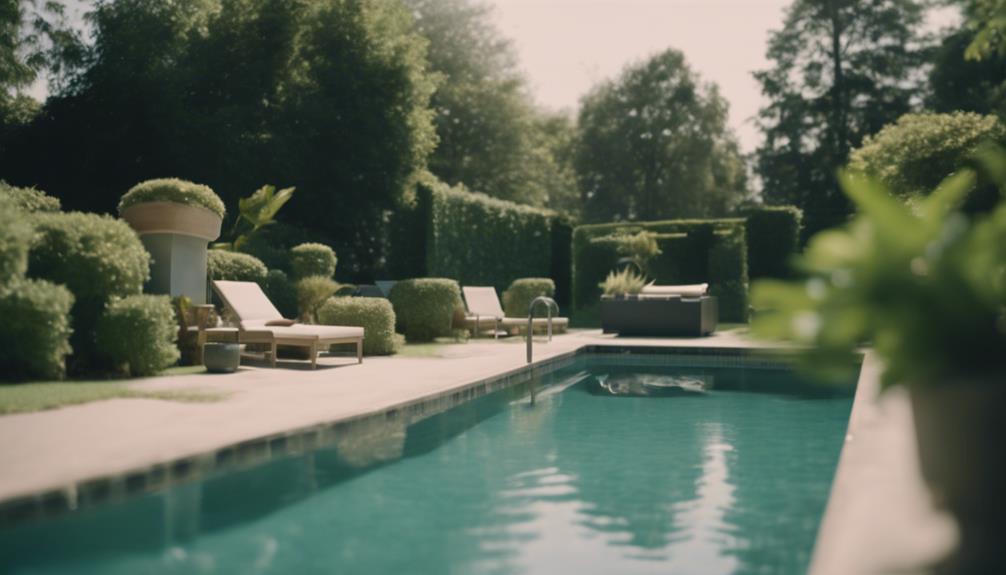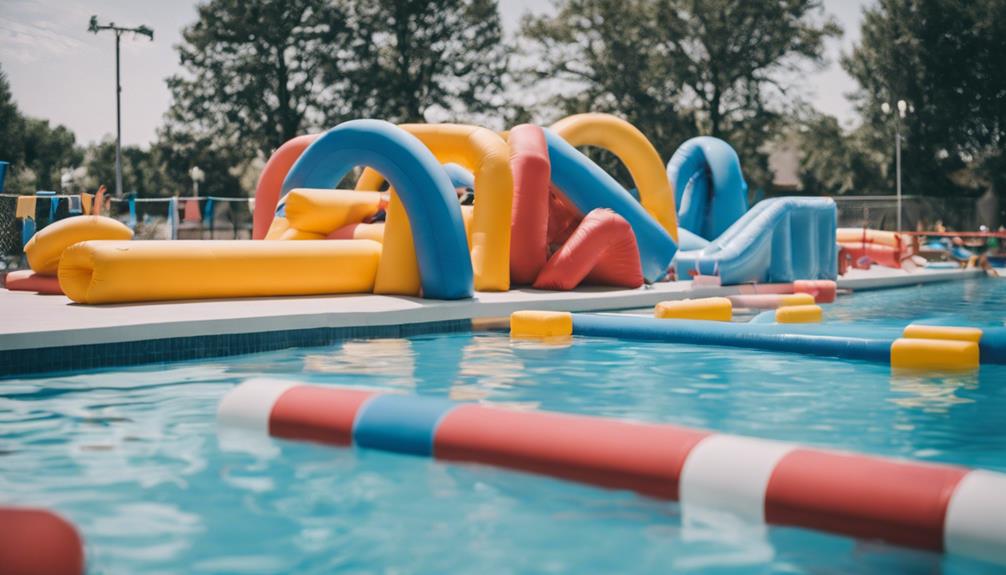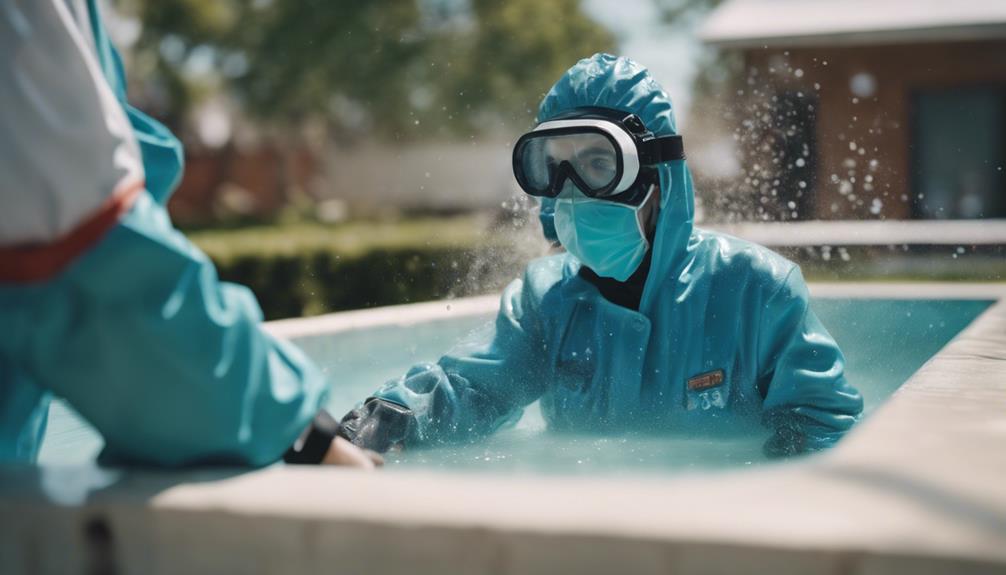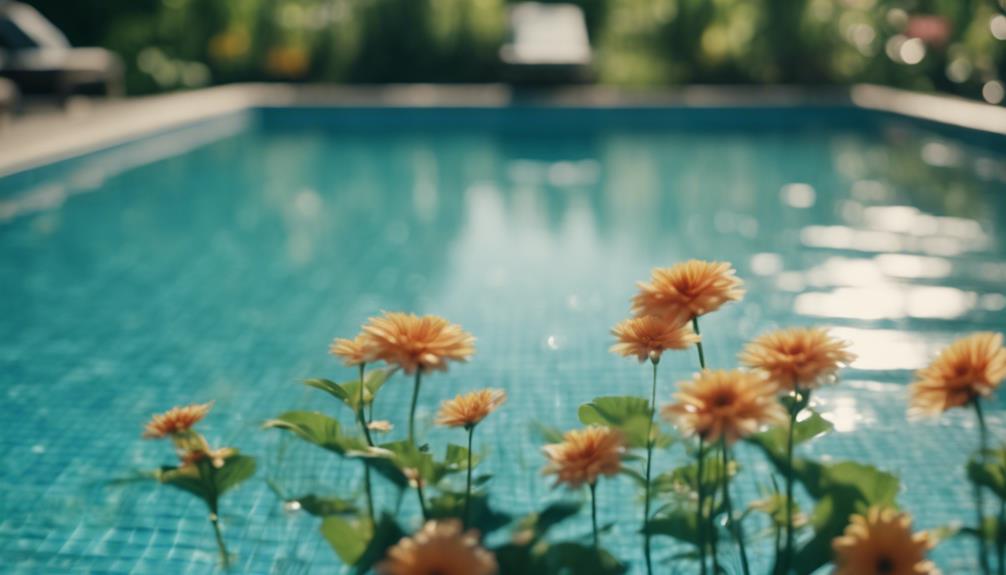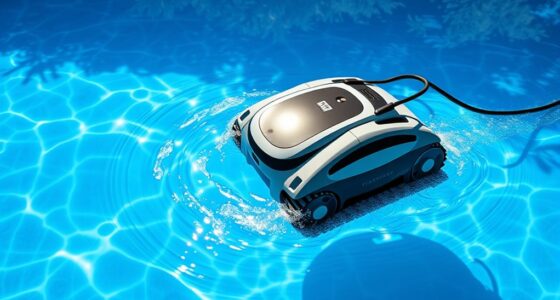Ever wondered why swimming pools rely on chlorine? Picture this, chlorine acts as a superhero, fighting off harmful bacteria while also serving as your pool’s personal bodyguard. It’s a powerful disinfectant, stopping those dangerous microbes from having a party in your water. Chlorine breaks down into hypochlorous acid and hypochlorite ion, working together to keep your pool free of germs. By attacking the cell walls of microorganisms, it ensures your swimming area remains crystal clear and safe. Psst, there’s even more interesting information on how chlorine operates behind the scenes if you’re interested!
Key Takeaways
- Chlorine keeps pool water clean by fighting off harmful bacteria and viruses.
- Maintains necessary pH levels for effective disinfection.
- Prevents the pool from becoming a breeding ground for germs.
- Acts as a disinfectant powerhouse, ensuring safe swimming conditions.
- Various forms like liquid, tablets, and granules cater to different pool maintenance needs.
Importance of Chlorine in Pools
Chlorine in pools is essential for keeping the water clean and safe for swimmers. When you jump into a pool, you want to make sure you're splashing around in water that won't make you sick, right? That's where chlorine comes in like a superhero, fighting off nasty bacteria that could cause all sorts of trouble.
Think of it as your pool's own personal bodyguard, constantly on the lookout for any germs trying to crash the pool party.
Bacteria, viruses, and other tiny troublemakers don't stand a chance against chlorine. It's like a disinfectant powerhouse, zapping those bad guys and keeping the water sparkling clean. Without chlorine, your pool could turn into a breeding ground for all sorts of yucky stuff. Nobody wants that, right?
Role of Chlorine in Disinfection
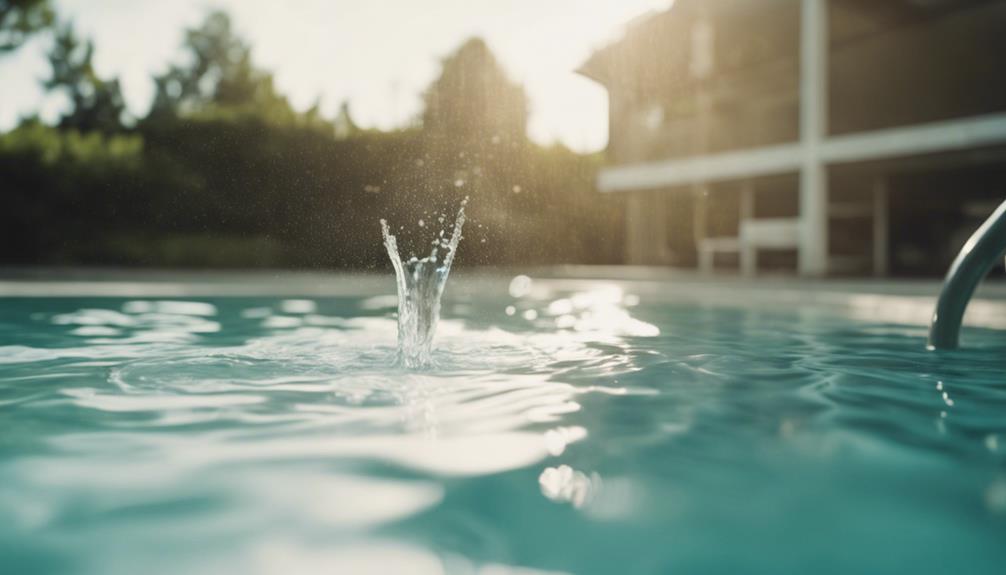
Maintaining proper chlorine levels in your swimming pool is essential for effective disinfection and ensuring a safe and hygienic environment for swimmers.
Chlorine is like a superhero in your pool, fighting off nasty bacteria, viruses, and other tiny troublemakers that could make you sick. When chlorine meets these contaminants, it breaks down into hypochlorous acid and hypochlorite ion, which then go on a mission to destroy the cell walls of these pesky impurities.
This chemical reaction is like a shield that keeps waterborne illnesses at bay, making your pool a cool and safe place to splash around. Not only does chlorine kick out the bad guys, but it also helps to keep your pool water crystal clear, clean, and free from algae and bacteria growth.
How Chlorine Works in Pools
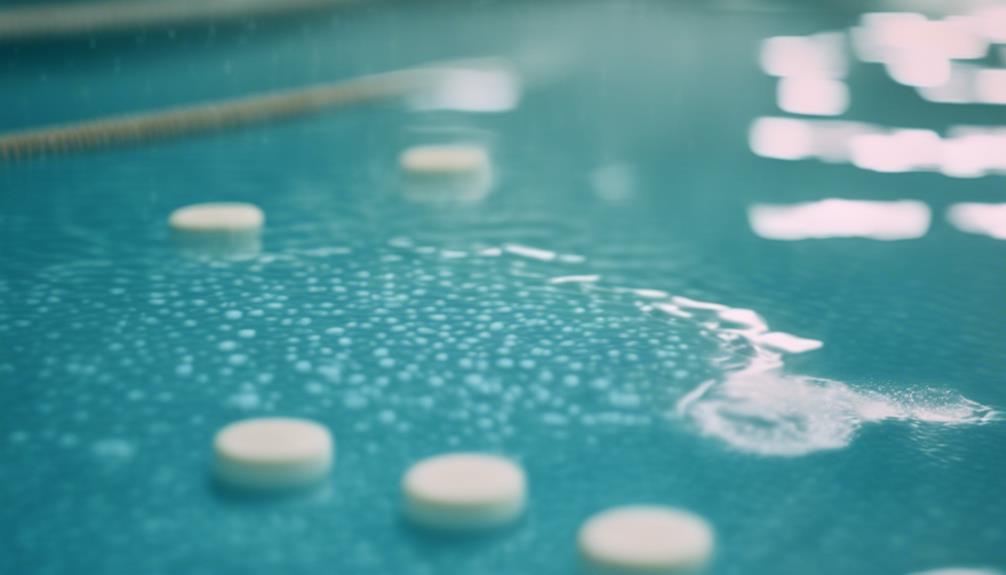
So, how does chlorine keep your pool water clean and safe?
Well, chlorine works its magic by breaking down into hypochlorous acid and hypochlorite ion, which are like secret agents against bacteria and germs.
The hypochlorous acid jumps into action in mere seconds, while its sidekick, hypochlorite ion, takes a bit longer, up to 30 minutes, to start blasting away at any contaminants lingering in the water.
It's like having a dynamic duo on a mission to keep your pool sparkling and germ-free!
Chlorine Kills Bacteria
To effectively disinfect pool water, chlorine operates by breaking down into hypochlorous acid (HOCl) and hypochlorite ion, which target and eliminate bacteria. HOCl, the active form of chlorine, is a powerful weapon against germs in your pool. It works by attacking the cell walls of microorganisms, like bacteria, disrupting their metabolic processes and preventing them from multiplying.
This means chlorine doesn't just sit there looking pretty; it's actively fighting off those nasty bugs to keep your pool safe for swimming.
Imagine chlorine as a shield, protecting you from invisible enemies that could make you sick. By maintaining the right chlorine levels in your pool, you're ensuring that harmful bacteria and viruses are kept in check.
Maintains Water Quality
Chlorine in pools effectively safeguards water quality by actively eliminating bacteria and algae through its breakdown into hypochlorous acid and hypochlorite ion. Imagine this: when you take a plunge in a pool, chlorine gets to work, zapping those pesky bacteria and algae, making sure the water stays crystal clear. It's like having a tiny army fighting off any unwanted guests in your swimming zone!
Proper chlorine levels are key to keeping the water clean and safe for everyone. You see, hypochlorous acid and hypochlorite ion are like the superheroes of the pool world, attacking those sneaky microorganisms by disrupting their cell walls and messing up their crucial processes. This ensures that the water remains free from contaminants and stops algae and bacteria from throwing a pool party of their own.
Benefits of Using Chlorine
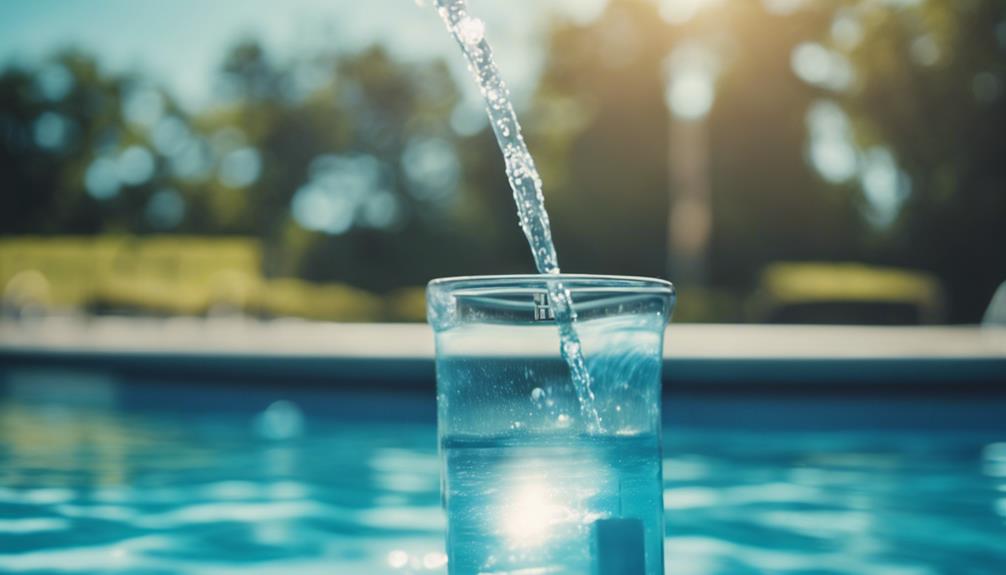
Keeping your swimming pool clean and safe relies heavily on the benefits of using chlorine. Chlorine is like a superhero for your pool, fighting off harmful microorganisms like bacteria, viruses, and algae. By adding chlorine to your pool, you're not just cleaning it; you're creating an essential oasis for your swimming adventures.
Imagine this: without chlorine, your pool could become a breeding ground for all sorts of nasty stuff. But with chlorine on patrol, it zaps those germs away, ensuring that the water stays crystal clear and safe for you to splash around in.
Not only does chlorine keep the water clean, but it also helps maintain the necessary pH levels in your pool. This balance is vital for effective disinfection and creating the perfect swimming conditions.
Different Forms of Chlorine

Among the options available for pool chlorination systems, various forms of chlorine offer flexibility in maintaining pool sanitation. Liquid chlorine, which is basically bleach, is a popular choice for keeping your pool water clean and safe. It's easy to use and effective in killing bacteria and algae.
Then there are chlorine tablets, these little guys are like the steady Eddies of pool disinfection, slowly dissolving to provide continuous sanitation. They're super convenient for those who want to set it and forget it.
Lastly, we've chlorine granules. These bad boys are like the shock troops of pool maintenance, perfect for zapping away any unwanted contaminants in a flash. Each type of chlorine product has its own unique benefits, catering to different pool maintenance needs and personal preferences.
Proper Chlorine Maintenance and Testing

To maintain proper chlorine levels and guarantee effective disinfection in your pool, it is essential to regularly monitor chlorine levels using test kits. Balancing pH levels between 7.2 and 7.6 is key for peak chlorine action. Shock treatments are also necessary to eliminate contaminants and keep your pool clean. This proper chlorine maintenance ensures not only the effectiveness of the chlorine but also the safety of the water in your swimming pool.
Let's break down the essentials of proper chlorine maintenance and testing in this handy table:
| Maintenance Tip | Description |
|---|---|
| Regularly monitor chlorine levels | Use test kits to verify chlorine levels are adequate for disinfection. |
| Maintain pH levels | Keep pH between 7.2 and 7.6 to maximize chlorine's disinfection capabilities. |
| Conduct shock treatments | Eliminate contaminants and maintain pool cleanliness by performing shock treatments regularly. |
| Ensure chlorine effectiveness and safety | Proper maintenance guarantees chlorine works effectively and keeps your pool water safe. |
Frequently Asked Questions
Is Chlorine Necessary in a Pool?
Yep, chlorine is like the superhero of pools, keeping things clean and safe for your splish-splashing fun.
It's totally necessary to zap those germs, algae, and other nasties that might try to crash your pool party.
Without chlorine, things could get pretty gnarly and not in a good way.
Why Can't You Swim in a Pool Without Chlorine?
You can't swim in a pool without chlorine because chlorine is like the superhero that fights off all the nasty stuff lurking in the water, like bacteria, viruses, and algae.
Without chlorine, those bad guys would throw a pool party of their own, making the water all cloudy and gross.
What Happens if You Don't Put Chlorine in a Pool?
If you skip adding chlorine to your pool, it's like inviting a big party of sneaky bacteria and slimy algae to come and crash in your water. Without chlorine, these uninvited guests can multiply fast, turning your pool into a wild, green mess.
Not using chlorine means you're giving these troublemakers a free pass to make your pool a germ-filled zone, which can make swimming risky and not so fun.
Why Is Pool Using so Much Chlorine?
So, why are pools chugging chlorine like there's no tomorrow? Well, it's all about keeping that water squeaky clean.
Think about it, the more people splash around, the more germs and gunk they leave behind.
Plus, outdoor pools get a double whammy with the sun and warm weather speeding up chlorine breakdown.
Don't forget rain and leaves adding to the mess!
It's a chlorine party to keep you swimming safe and sound!
Conclusion
So there you have it, folks! Chlorine is like the superhero of swimming pools, fighting off germs and keeping the water clean and safe for all of us to splash around in.
Just imagine diving into a crystal-clear pool, the sun shining down, and knowing that chlorine is working hard behind the scenes to make it all possible. It's like having your own personal pool guardian angel, keeping everything in tip-top shape.
Happy swimming!

